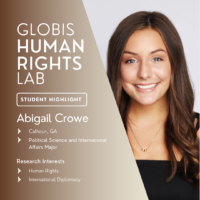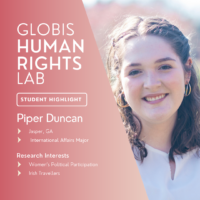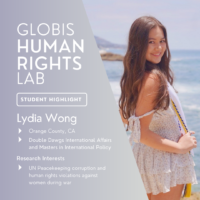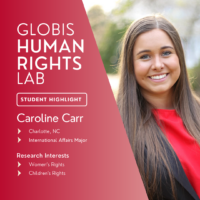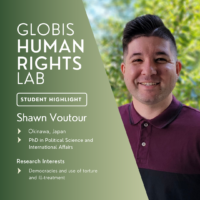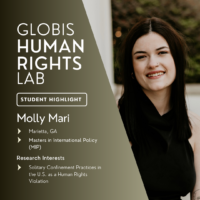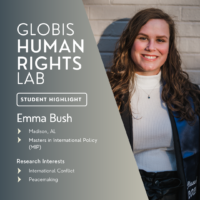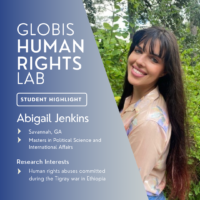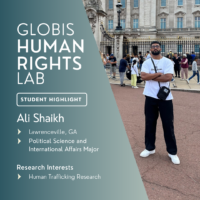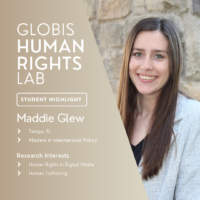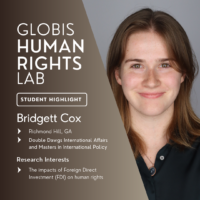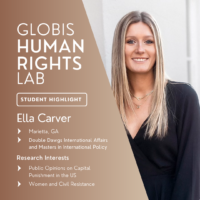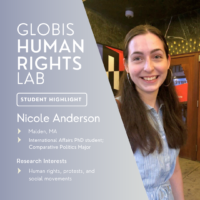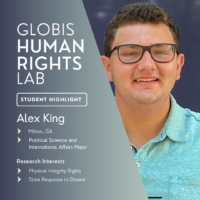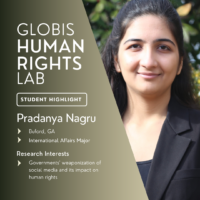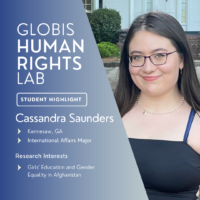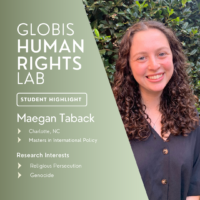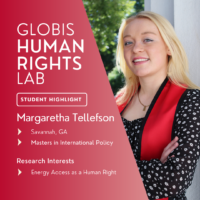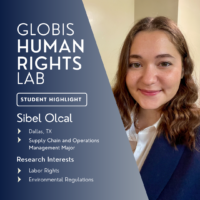
Human rights research, education, and engagement have been central to the work done at the Center for the Study of Global Issues (GLOBIS) since its founding, and GLOBIS’ current work proudly continues and builds on that tradition. GLOBIS human rights projects make human rights data available and accessible to stakeholders all over the globe, produce cutting-edge research on the causes and consequences of human rights practices, and train the next generation of human rights-focused scholars, policymakers, and practitioners.
Human Rights Measurement Initiative (HRMI)
The Human Rights Measurement Initiative (HRMI) is a global collaborative project between human rights scholars and practitioners aiming to produce rigorous and accessible data on human rights practices for every country in the world on every human right found in international law. Co-founded by GLOBIS director K. Chad Clay with Anne-Marie Brook and Susan Randolph, GLOBIS is one of the institutions that works to produce those data every year in collaboration with scholars and practitioners based all around the world. To learn more about HRMI, visit the project’s website at https://humanrightsmeasurement.org/. Or, to go straight to HRMI’s data and visualizations, visit the HRMI Rights Tracker at https://rightstracker.org/.
GLOBIS Human Rights Research Lab - Information & Application
The GLOBIS Human Rights Research Lab is a selective program for UGA undergraduate and graduate students interested in getting hands-on experience with human rights research, education, and engagement. Students who participate in the lab take part in GLOBIS human rights projects while taking advanced human rights and research design classes. Ultimately, each student produces a unique independent research product using the skills learned from GLOBIS projects and from the class materials.
Students in the Lab are permitted to register for INTL 4622R – GLOBIS Human Rights Research, which is repeatable for a maximum of 9 credit hours. The expectation is that most students will participate in the Lab for two semesters, receiving 3 hours of credit in each. However, additional semesters of participation beyond the first are not guaranteed and invitations to remain in the Lab beyond the first semester are based on performance.
Students interested in participating must apply for the lab during the semester prior to joining. The application, along with its corresponding deadline, will be posted here, typically around the midterm of the prior semester. While there are no required prerequisite courses to be admitted to the Lab, prior coursework in human rights does improve the likelihood of admission. The application also requires a 300-word or less personal statement about why the applicant is interested in participating in the GLOBIS Human Rights Research Lab and why the applicant is a good fit for the program, as well as an unofficial copy of the applicant’s transcript.
Applications for Fall 2024 are now open! The deadline to submit applications is March 15, 2024.
Click here to apply for the Fall 2024 GLOBIS Human Rights Research Lab
GLOBIS Human Rights Research Lab - Current Cohort Highlights
SouthEastern Rights Network
The SouthEastern Rights Network (SERN) is an organization aimed at connecting scholars who do human rights-related research and are based at institutions and organizations in the southeastern United States. SERN was founded in 2017 as the Georgia Human Rights Network (GAHRNet) by scholars from Emory University, Georgia State University, and the University of Georgia. However, from its very first workshop, the network included scholars from other institutions in the region. Starting with its first workshop outside of the state of Georgia, held at Vanderbilt University in Fall 2022, the network changed its name to SERN to reflect its broader membership and to encourage further participation by others.
SERN holds two workshops every year, each hosted by an institution in the region. SERN workshops give human rights scholars in the region the opportunity to present their work and get feedback in a friendly, constructive environment. We especially encourage the involvement of graduate students and other junior scholars working on human rights-related topics.
GLOBIS is one of SERN’s founding institutions and maintains the SERN website. To sign up for SERN’s mailing list or stay up to date on SERN events, please visit the network’s website at https://www.southeasternrightsnet.org/.
